Cromartie Alan. Sir Matthew Hale, 1609-1676: Law, Religion and Natural Philosophy (Cambridge Studies in Early Modern British History) (ENG)
Подождите немного. Документ загружается.

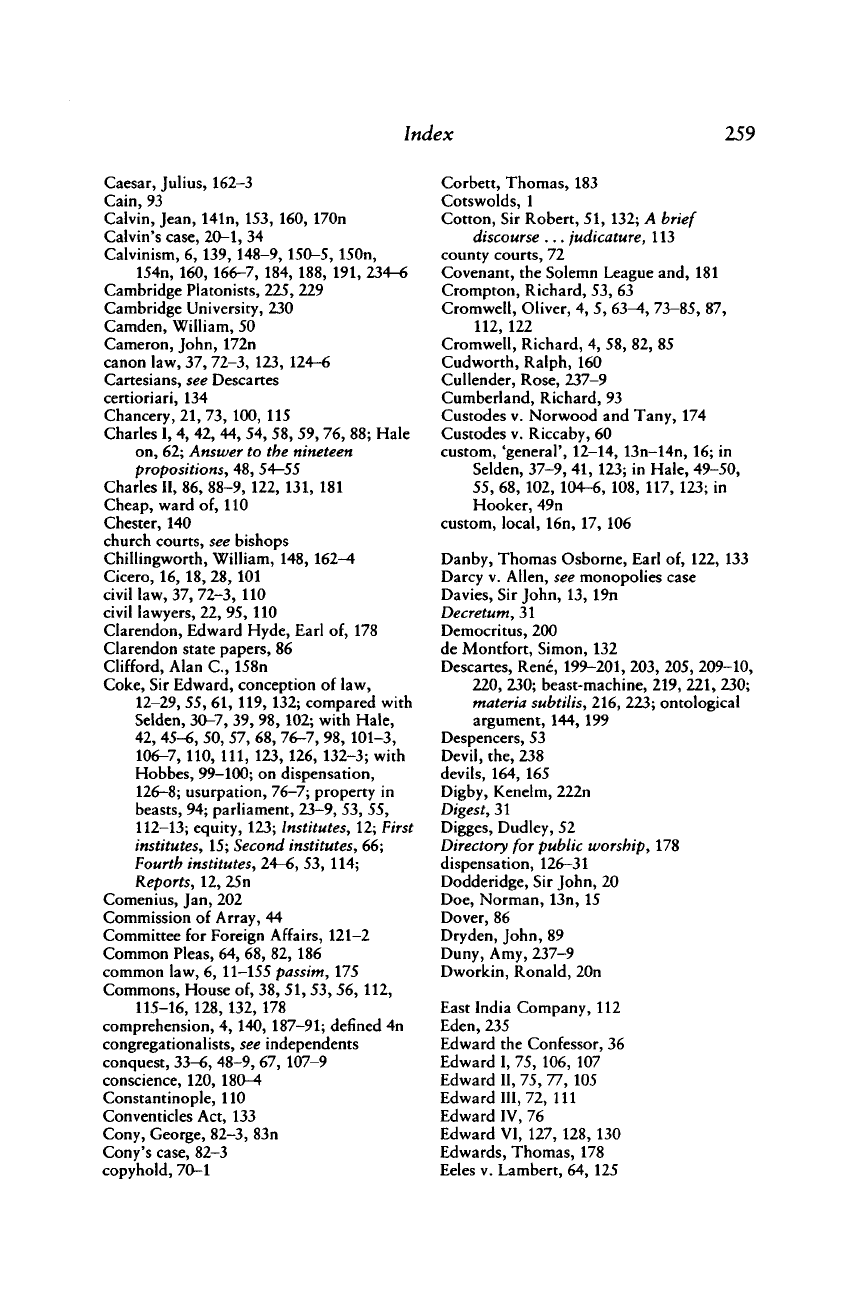
Index
259
Caesar, Julius, 162-3
Cain, 93
Calvin, Jean, 141n, 153, 160, 170n
Calvin's case, 20-1, 34
Calvinism, 6, 139, 148-9, 150-5, 150n,
154n, 160, 166-7, 184, 188, 191, 234-6
Cambridge Platonists, 225, 229
Cambridge University, 230
Camden, William, 50
Cameron, John, 172n
canon law, 37, 72-3, 123, 124-6
Cartesians, see Descartes
certioriari, 134
Chancery, 21, 73, 100, 115
Charles I, 4, 42, 44, 54, 58, 59, 76, 88; Hale
on,
62; Answer to the nineteen
propositions, 48, 54—55
Charles II, 86, 88-9, 122, 131, 181
Cheap,
ward of, 110
Chester, 140
church courts, see bishops
Chillingworth, William, 148, 162^*
Cicero, 16, 18, 28, 101
civil law, 37, 72-3, 110
civil lawyers, 22, 95, 110
Clarendon, Edward Hyde, Earl of, 178
Clarendon state papers, 86
Clifford, Alan C, 158n
Coke, Sir Edward, conception of law,
12-29,
55, 61, 119, 132; compared with
Selden, 30-7, 39, 98, 102; with Hale,
42,
45-6, 50, 57, 68, 76-7, 98, 101-3,
106-7, 110, 111, 123, 126, 132-3; with
Hobbes, 99-100; on dispensation,
126—8;
usurpation, 76—7; property in
beasts, 94; parliament, 23-9, 53, 55,
112-13;
equity, 123; Institutes, 12; First
institutes, 15; Second institutes, 66',
Fourth institutes, 24—6, 53, 114;
Reports, 12, 25n
Comenius, Jan, 202
Commission of Array, 44
Committee for Foreign Affairs, 121-2
Common Pleas, 64, 68, 82, 186
common law, 6, 11-155 passim, 175
Commons, House of, 38, 51, 53, 56, 112,
115-16, 128, 132, 178
comprehension, 4, 140, 187-91; defined 4n
congregationalists, see independents
conquest, 33-6, 48-9, 67, 107-9
conscience, 120, 180-4
Constantinople, 110
Conventicles Act, 133
Cony, George, 82-3, 83n
Cony's case, 82-3
copyhold, 70-1
Corbett, Thomas, 183
Cotswolds, 1
Cotton, Sir Robert, 51, 132; A brief
discourse ... judicature, 113
county courts, 72
Covenant, the Solemn League and, 181
Crompton, Richard, 53, 63
Cromwell, Oliver, 4, 5, 63-A, 73-85, 87,
112,
122
Cromwell, Richard, 4, 58, 82, 85
Cudworth, Ralph, 160
Cullender, Rose, 237-9
Cumberland, Richard, 93
Custodes v. Norwood and Tany, 174
Custodes v. Riccaby, 60
custom, 'general', 12—14, 13n—14n, 16; in
Selden, 37-9, 41, 123; in Hale, 49-50,
55,
68, 102, 104-6, 108, 117, 123; in
Hooker, 49n
custom, local, 16n, 17, 106
Danby, Thomas Osborne, Earl of, 122, 133
Darcy v. Allen, see monopolies case
Davies, Sir John, 13, 19n
Decretutn, 31
Democritus, 200
de Montfort, Simon, 132
Descartes, Rene, 199-201, 203, 205, 209-10,
220,
230; beast-machine, 219, 221, 230;
materia subtilis, 216, 223; ontological
argument, 144, 199
Despencers, 53
Devil, the, 238
devils, 164, 165
Digby, Kenelm, 222n
Digest,
31
Digges, Dudley, 52
Directory for public worship, 178
dispensation, 126-31
Dodderidge, Sir John, 20
Doe, Norman, 13n, 15
Dover, 86
Dryden, John, 89
Duny, Amy, 237-9
Dworkin, Ronald, 20n
East India Company, 112
Eden, 235
Edward the Confessor, 36
Edward I, 75, 106, 107
Edward II, 75, 77, 105
Edward III, 72, 111
Edward IV, 76
Edward VI, 127, 128, 130
Edwards, Thomas, 178
Eeles v. Lambert, 64, 125
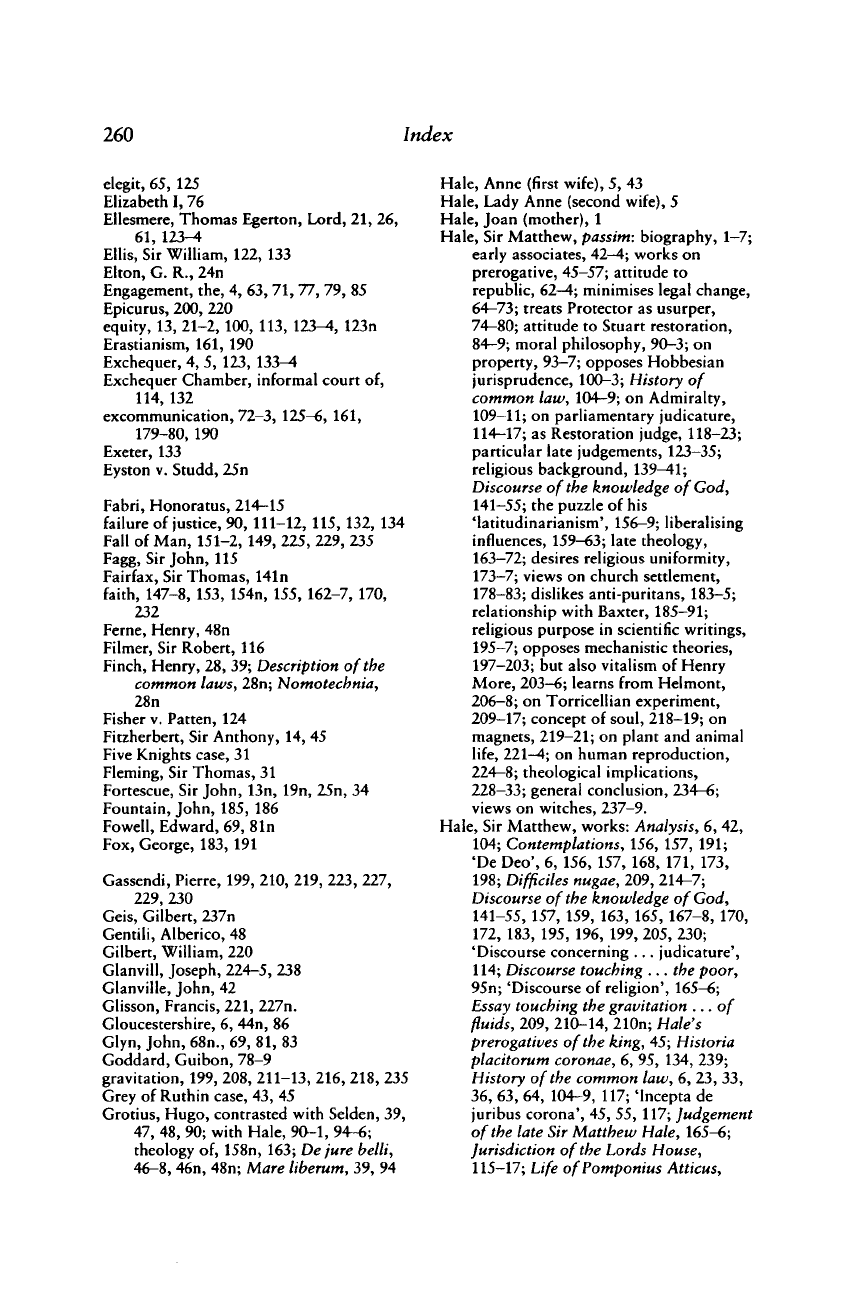
260
Index
elegit, 65, 125
Elizabeth I, 76
Ellesmere, Thomas Egerton, Lord, 21, 26,
61,
123-4
Ellis,
Sir William, 122, 133
Elton, G. R., 24n
Engagement, the, 4, 63, 71, 77, 79, 85
Epicurus, 200, 220
equity, 13, 21-2, 100, 113, 123-4, 123n
Erastianism, 161, 190
Exchequer, 4, 5, 123, 133-4
Exchequer Chamber, informal court of,
114,
132
excommunication, 72-3, 125-6, 161,
179-80, 190
Exeter, 133
Eyston v. Studd, 25n
Fabri, Honoratus, 214—15
failure of justice, 90, 111-12, 115, 132, 134
Fall of Man, 151-2, 149, 225, 229, 235
Fagg, Sir John, 115
Fairfax, Sir Thomas, 141n
faith, 147-8, 153, 154n, 155, 162-7, 170,
232
Feme, Henry, 48n
Filmer, Sir Robert, 116
Finch, Henry, 28, 39; Description of the
common laws, 28n; Nomotechnia,
28n
Fisher v. Patten, 124
Fitzherbert, Sir Anthony, 14, 45
Five Knights case, 31
Fleming, Sir Thomas, 31
Fortescue, Sir John, 13n, 19n, 25n, 34
Fountain, John, 185, 186
Fowell, Edward, 69, 8In
Fox, George, 183, 191
Gassendi, Pierre, 199, 210, 219, 223, 227,
229,
230
Geis,
Gilbert, 237n
Gentili, Alberico, 48
Gilbert, William, 220
Glanvill, Joseph, 224-5, 238
Glanville, John, 42
Glisson, Francis, 221, 227n.
Gloucestershire, 6, 44n, 86
Glyn, John, 68n., 69, 81, 83
Goddard, Guibon, 78-9
gravitation, 199, 208, 211-13, 216, 218, 235
Grey of Ruthin case, 43, 45
Grotius, Hugo, contrasted with Selden, 39,
47,
48, 90; with Hale, 90-1, 94-6;
theology of, 158n, 163; De jure belli,
46-8,
46n, 48n; Mare liberum, 39, 94
Hale, Anne (first wife), 5, 43
Hale, Lady Anne (second wife), 5
Hale, Joan (mother), 1
Hale, Sir Matthew, passim: biography, 1-7;
early associates, 42-4; works on
prerogative, 45-57; attitude to
republic, 62-4; minimises legal change,
64-73;
treats Protector as usurper,
74—80;
attitude to Stuart restoration,
84—9;
moral philosophy, 90-3; on
property, 93-7; opposes Hobbesian
jurisprudence, 100-3; History of
common law, 104—9; on Admiralty,
109—11;
on parliamentary judicature,
114-17; as Restoration judge, 118-23;
particular late judgements, 123-35;
religious background, 139-41;
Discourse of the knowledge of God,
141-55;
the puzzle of his
'latitudinarianism', 156-9; liberalising
influences, 159—63; late theology,
163-72;
desires religious uniformity,
173—7; views on church settlement,
178-83;
dislikes anti-puritans, 183-5;
relationship with Baxter, 185-91;
religious purpose in scientific writings,
195-7; opposes mechanistic theories,
197-203;
but also vitalism of Henry
More, 203-6; learns from Helmont,
206—8;
on Torricellian experiment,
209-17; concept of soul, 218-19; on
magnets, 219—21; on plant and animal
life,
221-4; on human reproduction,
224-8;
theological implications,
228-33;
general conclusion, 234—6;
views on witches, 237-9.
Hale, Sir Matthew, works: Analysis, 6, 42,
104;
Contemplations, 156, 157, 191;
'De Deo', 6, 156, 157, 168, 171, 173,
198;
Difficiles nugae, 209, 214-7;
Discourse of the knowledge of God,
141-55,
157, 159, 163, 165, 167-8, 170,
172,
183, 195, 196, 199, 205, 230;
'Discourse concerning ... judicature',
114;
Discourse touching ... the poor,
95n;
'Discourse of religion', 165-6;
Essay touching the gravitation ... of
fluids, 209, 210-14, 210n; Hale's
prerogatives of the king, 45; Historia
placitorum coronae, 6, 95, 134, 239;
History of the common law, 6, 23, 33,
36,
63, 64, 104-9, 117; 'Incepta de
juribus corona', 45, 55, 117; Judgement
of the late Sir Matthew Hale, 165-6;
Jurisdiction of the Lords House,
115—17; Life of Pomponius Atticus,

Index
261
62—3;
Observations touching ...
natural motions, 208, 209, 216; 'On the
amendment of laws', 69; 'On the
customs', 94—5, 96-7; 'On the nature of
laws',
7, 90-4; 'Preparatory notes', 45,
57,
114; 'Preparatory notes touching
the parliamentary proceedings', 115;
'Prerogativa regis', 45, 49, 109n;
Primitive origination, 6, 157, 199-202,
205,
218; 'Reflections on Hobbes',
100-3;
A treatise ... registering of
land,
71n-72n
Hale, Robert (grandfather), 1
Hale, Robert (father), 1, 2n
Hale Commission, 4, 70-3, 74
Hamilton, James, Duke of, 3, 44
Hardres' reports, 75n
Hare, John, 108
Harold, 49
Hargrave, Francis, 113, 115
Harrington, James, 58
Harvey, William, 221, 222n, 224
Harwood v. Paty, 65, 111, 125
Helmont, John Baptist van, 206-8, 218-19,
223,
227
Henry I, 51
Henry II, 37
Henry III, 51
Henry IV, 77
Henry VI, 21, 75
Henry VII, 75, 76, 104
Herle, Charles, 54
Heydon's case, 25-26
Hezekiah, 181-2
High Courts of Justice, 80, 84, 87
Highmore, Nathaniel, 222n
Hobbes, Thomas, 11, 90, 92-3, 105, 145,
159,
204n, 206, 238; Decameron
physiologicum,
21
In;
Dialogue
between a philosopher and a
student,
98-104;
Dialogus physicus, 213, 214n;
Leviathan, 17 In
Holies, Denzil, 112, 114
Hooker, Richard, 49n
Hoskyns, Bennet, 3
Hoskyns, John, 3
Hoveden, Roger of, 51
Howard, Sir Philip, 120
Humble Petition and Advice, 69, 113n
Hume, David, 197
Huntingtower, Lionel Tollemache, Lord,
131
Hunton, Philip, 48, 49n
Huggett, Hopkin, 120
Hylarchic Spirit, 204-5, 208, 212, 214
idolatry, 149, 175-^, 181-2, 231
imagination, see phantasy
impeachment, 53, 116
independents, 70, 87, 177-8, 180, 186-7,
188
India, 93
infinity, 143-4, 146, 199
Inns of court, 13,99, 118
Institutes (of Justinian), 11, 15
Instrument of Government, 75, 78, 80-1,
82-3
intellect (as opposed to will), 146—8, 153—5,
154n, 168, 171-2, 172n
Intellects Agens, 40, 91, 169-70, 172,
231-2
Ireland, 57
Irish cattle, 128, 130
Israel, people of, see Jews
ius gentium, see law of nations
Ives,
E. W., 15
Jackson, Thomas, 153
Jacobites, 76, 89
James VI and I, 20, 29, 35, 76, 127
James VII and II, 120, 184
Jenkins, David, 67n
Jenkins, Sir Leoline, 110
Jersey, 84
Jews,
19, 40, 44, 102, 159-62
Job,160, 166
John, 51,
66,16,
Johnson, Samuel, 6
Jones,
Sir Thomas, 118
Jonson, Ben, 185
juries, 110-11, 113-14, 133-4, 238
Justinian, 195; see also Institutes, Digest
'Keepers of the liberties', 60-1, 73, 74, 80
Kelyng, Sir John, 120, 121, 122n, 123, 133,
134,
186, 238
Kendall, R. T., 154, 157
King's Bench, 1, 4, 22n, 27, 110, 112, 123,
131,
174, 186; as 'Upper Bench', 63, 82,
84-5,
174
Kingscot, Antony, 2, 140
Kingscot, Christopher, 2
King v. Standish, 123
Knott, Edward, 162
Lambarde, William, 24, 25; Archeion, 53
Lambeth Palace, 156, 159
Lamont, William, 190
Lancaster, Duchy of, 124
Lancastrian kings, 75
latitudinarianism, 139-10, 139n, 155, 175,
191,
212, 236
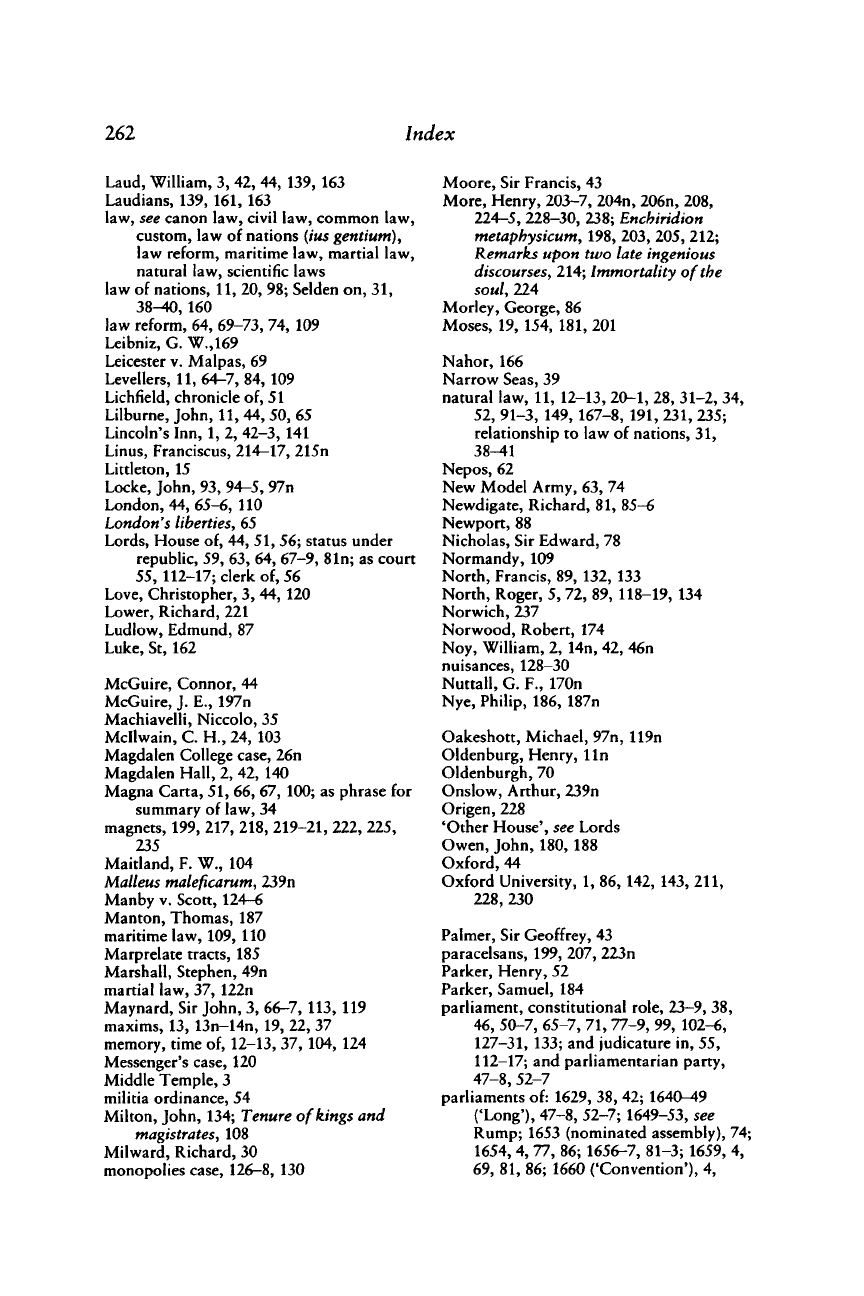
262
Index
Laud, William, 3, 42, 44, 139, 163
Laudians, 139, 161, 163
law, see canon law, civil law, common law,
custom, law of nations (ius gentium),
law reform, maritime law, martial law,
natural law, scientific laws
law of nations, 11, 20, 98; Selden on, 31,
38-40,
160
law reform, 64, 69-73, 74, 109
Leibniz, G. W.,169
Leicester v. Malpas, 69
Levellers, 11, 64-7, 84, 109
Lichfield, chronicle of, 51
Lilburne, John, 11, 44, 50, 65
Lincoln's Inn, 1, 2, 42—3, 141
Linus, Franciscus, 214—17, 215n
Littleton, 15
Locke, John, 93, 94-5, 97n
London,44, 65-6, 110
London's liberties, 65
Lords, House of, 44, 51, 56; status under
republic, 59, 63, 64, 67-9, 81n; as court
55,
112-17; clerk of, 56
Love, Christopher, 3, 44, 120
Lower, Richard, 221
Ludlow, Edmund, 87
Luke, St, 162
McGuire, Connor, 44
McGuire, J. E., 197n
Machiavelli, Niccolo, 35
Mcllwain, C. K, 24, 103
Magdalen College case, 26n
Magdalen Hall, 2, 42, 140
Magna Carta, 51, 66, 67, 100; as phrase for
summary of law, 34
magnets, 199, 217, 218, 219-21, 222, 225,
235
Maitland, F. W., 104
Malleus maleficarum, 239n
Manby v. Scott, 124-6
Manton, Thomas, 187
maritime law, 109, 110
Marprelate tracts, 185
Marshall, Stephen, 49n
martial law, 37, 122n
Maynard, Sir John, 3, 66-7, 113, 119
maxims, 13, 13n-14n, 19, 22, 37
memory, time of, 12-13, 37, 104, 124
Messenger's case, 120
Middle Temple, 3
militia ordinance, 54
Milton, John, 134; Tenure of kings and
magistrates, 108
Milward, Richard, 30
monopolies case, 126-8, 130
Moore, Sir Francis, 43
More, Henry, 203-7, 204n, 206n, 208,
224-5,
228-30, 238; Enchiridion
metaphysicum, 198, 203, 205, 212;
Remarks upon two late ingenious
discourses, 214; Immortality of the
soul,
224
Morley, George, 86
Moses, 19, 154, 181, 201
Nahor, 166
Narrow Seas, 39
natural law, 11, 12-13, 20-1, 28, 31-2, 34,
52,
91-3, 149, 167-8, 191, 231, 235;
relationship to law of nations, 31,
38-41
Nepos, 62
New Model Army, 63, 74
Newdigate, Richard, 81, 85-6
Newport, 88
Nicholas, Sir Edward, 78
Normandy, 109
North, Francis, 89, 132, 133
North, Roger, 5, 72, 89, 118-19, 134
Norwich, 237
Norwood, Robert, 174
Noy, William, 2, 14n, 42, 46n
nuisances, 128-30
Nuttall, G. F., 170n
Nye, Philip, 186, 187n
Oakeshott, Michael, 97n, 119n
Oldenburg, Henry, lln
Oldenburgh, 70
Onslow, Arthur, 239n
Origen, 228
* Other House', see Lords
Owen, John, 180, 188
Oxford, 44
Oxford University, 1, 86, 142, 143, 211,
228,
230
Palmer, Sir Geoffrey, 43
paracelsans, 199, 207, 223n
Parker, Henry, 52
Parker, Samuel, 184
parliament, constitutional role, 23-9, 38,
46,
50-7, 65-7, 71, 77-9, 99, 102-6,
127-31,
133; and judicature in, 55,
112-17; and parliamentarian party,
47-8,
52-7
parliaments of: 1629, 38, 42; 1640-^9
('Long'), 47-8, 52-7; 1649-53, see
Rump;
1653 (nominated assembly), 74;
1654,
4, 77, 86; 1656-7, 81-3; 1659, 4,
69,
81, 86; 1660 ('Convention'), 4,
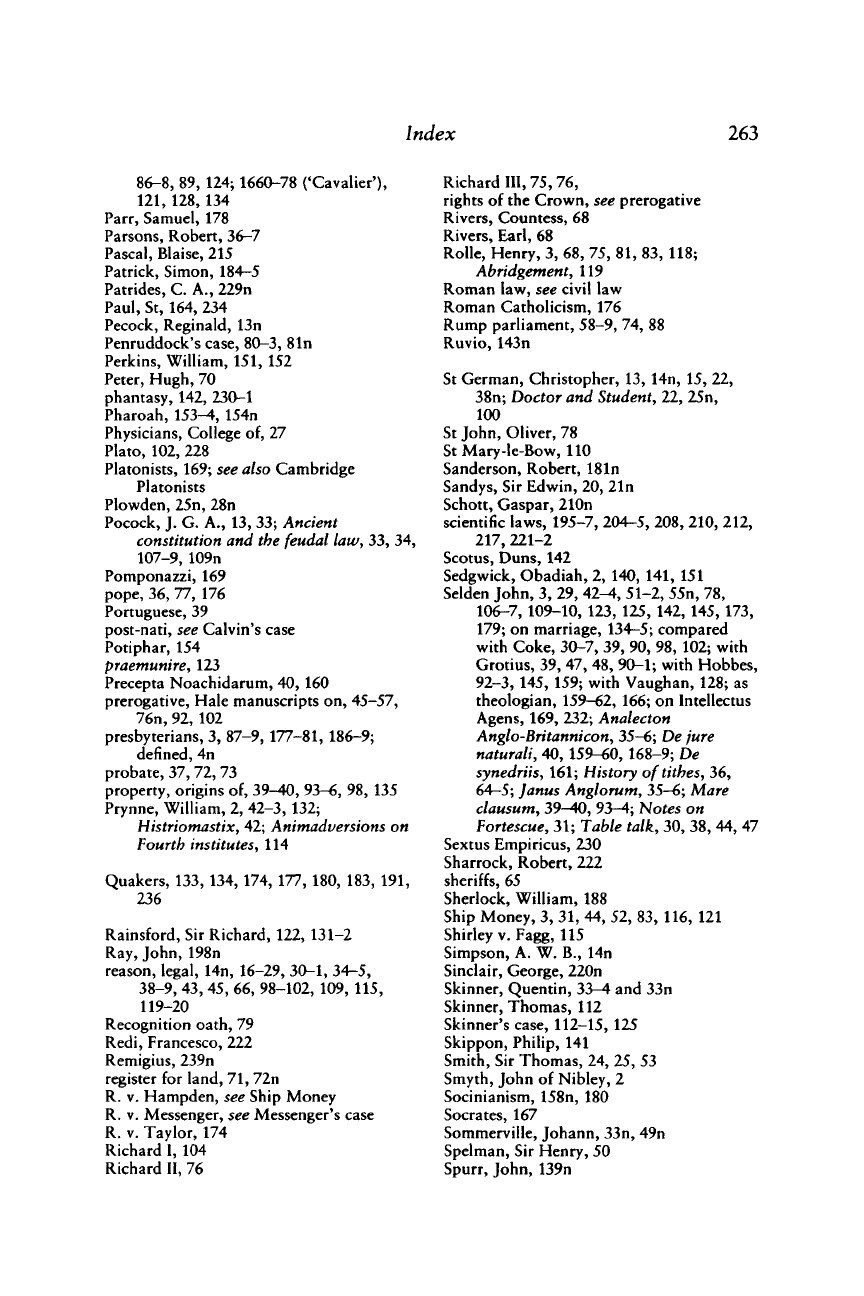
Index
263
86-8,
89, 124; 1660-78 ('Cavalier'),
121,
128, 134
Parr, Samuel, 178
Parsons, Robert, 36—7
Pascal, Blaise, 215
Patrick, Simon, 184—5
Patricks, C. A., 229n
Paul, St, 164, 234
Pecock, Reginald, 13n
Penruddock's case, 80-3, 81n
Perkins, William, 151, 152
Peter, Hugh, 70
phantasy, 142, 230-1
Pharoah, 153-4, 154n
Physicians, College of, 27
Plato,
102, 228
Platonists, 169; see also Cambridge
Platonists
Plowden, 25n, 28n
Pocock, J. G. A., 13, 33; Ancient
constitution and the feudal law, 33, 34,
107-9,
109n
Pomponazzi, 169
pope, 36, 77, 176
Portuguese, 39
post-nati, see Calvin's case
Potiphar, 154
praemunire, 123
Precepta Noachidarum, 40, 160
prerogative, Hale manuscripts on, 45-57,
76n,
92, 102
presbyterians, 3, 87-9, 177-81, 186-9;
defined, 4n
probate, 37, 72, 73
property, origins of, 39-40, 93-6, 98, 135
Prynne, William, 2, 42-3, 132;
Histriomastix, 42; Animadversions on
Fourth institutes, 114
Quakers, 133, 134, 174, 177, 180, 183, 191,
236
Rainsford, Sir Richard, 122, 131-2
Ray, John, 198n
reason, legal, 14n, 16-29, 30-1, 34-5,
38-9,
43, 45, 66, 98-102, 109, 115,
119-20
Recognition oath, 79
Redi, Francesco, 222
Remigius, 239n
register for land, 71, 72n
R. v. Hampden, see Ship Money
R. v. Messenger, see Messenger's case
R. v. Taylor, 174
Richard I, 104
Richard II, 76
Richard III, 75, 76,
rights of the Crown, see prerogative
Rivers, Countess, 68
Rivers, Earl, 68
Rolle, Henry, 3, 68, 75, 81, 83, 118;
Abridgement, 119
Roman law, see civil law
Roman Catholicism, 176
Rump parliament, 58-9, 74, 88
Ruvio, 143n
St German, Christopher, 13, 14n, 15, 22,
38n;
Doctor and Student, 22, 25n,
100
St John, Oliver, 78
St Mary-le-Bow, 110
Sanderson, Robert, 181n
Sandys, Sir Edwin, 20, 21n
Schott, Gaspar, 210n
scientific laws, 195-7, 204-5, 208, 210, 212,
217,
221-2
Scotus, Duns, 142
Sedgwick, Obadiah, 2, 140, 141, 151
Selden John, 3, 29, 42-4, 51-2, 55n, 78,
106-7, 109-10, 123, 125, 142, 145, 173,
179;
on marriage, 134—5; compared
with Coke, 30-7, 39, 90, 98, 102; with
Grotius, 39, 47, 48, 90-1; with Hobbes,
92-3,
145, 159; with Vaughan, 128; as
theologian, 159-62, 166; on Intellectus
Agens, 169, 232; Analecton
Anglo-Britannicon, 35-6; De jure
naturali, 40, 159-60, 168-9; De
synedriis, 161; History of tithes, 36,
64—5;
Janus Anglorum, 35—6; Mare
clausum, 39-40, 93-4; Notes on
Fortescue, 31; Table talk, 30, 38, 44, 47
Sextus Empiricus, 230
Sharrock, Robert, 222
sheriffs, 65
Sherlock, William, 188
Ship Money, 3, 31, 44, 52, 83, 116, 121
Shirley v. Fagg, 115
Simpson, A. W. B., 14n
Sinclair, George, 220n
Skinner, Quentin, 33-4 and 33n
Skinner, Thomas, 112
Skinner's case, 112-15, 125
Skippon, Philip, 141
Smith, Sir Thomas, 24, 25, 53
Smyth, John of Nibley, 2
Socinianism, 158n, 180
Socrates, 167
Sommerville, Johann, 33n, 49n
Spelman, Sir Henry, 50
Spurr, John, 139n
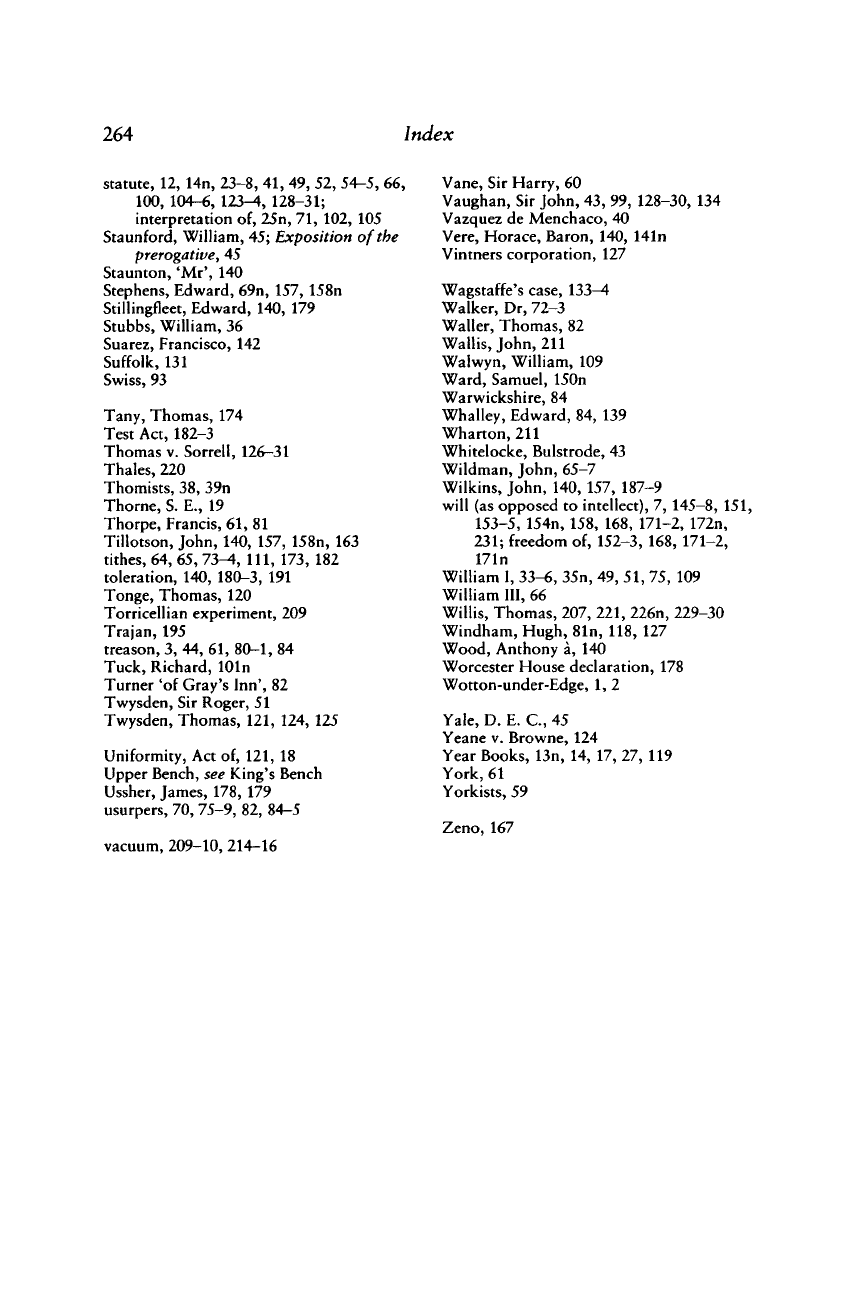
264
Index
statute, 12, 14n, 23-8, 41, 49, 52, 54-5, 66,
100, 104-6, 123-4, 128-31;
interpretation of, 25n, 71, 102, 105
Staunford, William, 45; Exposition of the
prerogative, 45
Staunton, 'Mr', 140
Stephens, Edward, 69n, 157, 158n
Stillingfleet, Edward, 140, 179
Stubbs, William, 36
Suarez, Francisco, 142
Suffolk, 131
Swiss, 93
Tany, Thomas, 174
Test Act, 182-3
Thomas v. Sorrell, 126-31
Thales, 220
Thomists, 38, 39n
Thorne, S. E., 19
Thorpe, Francis, 61, 81
Tillotson, John, 140, 157, 158n, 163
tithes, 64, 65, 71-A, 111, 173, 182
toleration, 140, 180-3, 191
Tonge, Thomas, 120
Torricellian experiment, 209
Trajan, 195
treason, 3, 44, 61, 80-1, 84
Tuck, Richard, lOln
Turner 'of Gray's Inn', 82
Twysden, Sir Roger, 51
Twysden, Thomas, 121, 124, 125
Uniformity, Act of, 121, 18
Upper Bench, see King's Bench
Ussher, James, 178, 179
usurpers, 70, 75-9, 82, 84-5
vacuum, 209-10, 214-16
Vane, Sir Harry, 60
Vaughan, Sir John, 43, 99, 128-30, 134
Vazquez de Menchaco, 40
Vere, Horace, Baron, 140, 141n
Vintners corporation, 127
Wagstaffe's case, 133-4
Walker, Dr, 72-3
Waller, Thomas, 82
Wallis, John, 211
Walwyn, William, 109
Ward, Samuel, 150n
Warwickshire, 84
Whalley, Edward, 84, 139
Wharton,211
Whitelocke, Bulstrode, 43
Wildman, John, 65-7
Wilkins, John, 140, 157, 187-9
will (as opposed to intellect), 7, 145-8, 151,
153-5, 154n,158,168, 171-2, 172n,
231;
freedom of, 152-3, 168, 171-2,
171n
William I, 33-^6, 35n, 49, 51, 75, 109
William III, 66
Willis, Thomas, 207, 221, 226n, 229-30
Windham, Hugh, 81n, 118, 127
Wood, Anthony a, 140
Worcester House declaration, 178
Wotton-under-Edge, 1, 2
Yale, D. E. C, 45
Yeane v. Browne, 124
Year Books, 13n, 14, 17, 27, 119
York, 61
Yorkists, 59
Zeno, 167
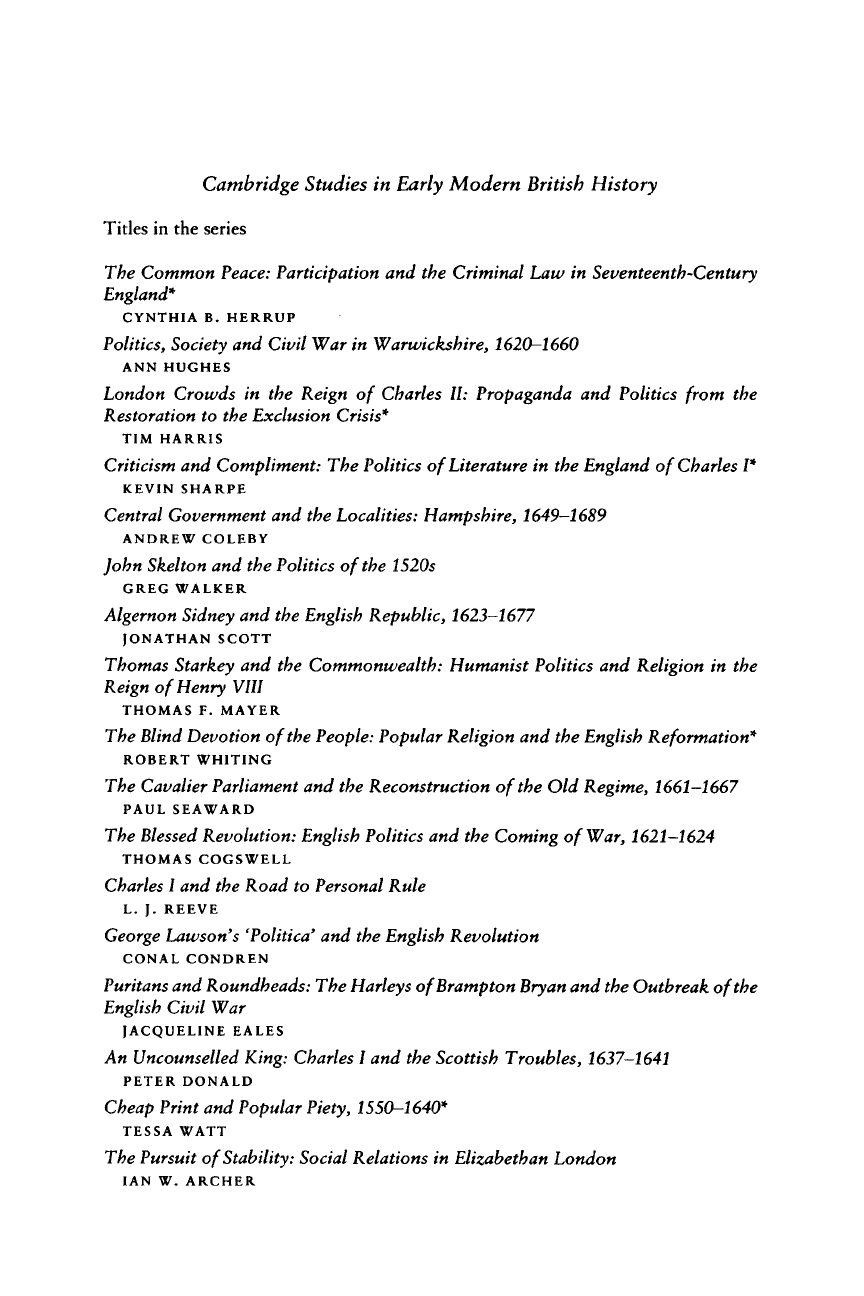
Cambridge Studies in Early Modern British History
Titles in the series
The Common
Peace:
Participation and the Criminal Law in Seventeenth-Century
England*
CYNTHIA B. HERRUP
Politics,
Society and Civil War in Warwickshire, 1620-1660
ANN HUGHES
London Crowds in the Reign of Charles II: Propaganda and Politics from the
Restoration to the Exclusion
Crisis*
TIM HARRIS
Criticism
and Compliment: The
Politics
of Literature in the England of
Charles
I*
KEVIN SHARPE
Central Government and the
Localities:
Hampshire, 1649-1689
ANDREW COLEBY
John Skelton and the
Politics
of
the 1520s
GREG WALKER
Algernon Sidney and the
English
Republic, 1623-1677
JONATHAN SCOTT
Thomas Starkey and the Commonwealth: Humanist Politics and Religion in the
Reign of
Henry
VIII
THOMAS F. MAYER
The Blind Devotion of the
People:
Popular Religion and the
English
Reformation*
ROBERT WHITING
The
Cavalier Parliament
and the Reconstruction of
the
Old Regime, 1661-1667
PAUL SEAWARD
The
Blessed
Revolution: English Politics and the Coming of
War,
1621-1624
THOMAS COGSWELL
Charles
I and the Road to
Personal
Rule
L. J. REEVE
George
Lawsons
f
Politica*
and the English Revolution
CONAL CONDREN
Puritans
and Roundheads: The
Harleys
ofBrampton
Bryan
and the Outbreak of the
English Civil War
JACQUELINE EALES
An
Uncounselled
King:
Charles 1
and the Scottish Troubles, 1637-1641
PETER DONALD
Cheap Print and Popular
Piety,
1550-1640*
TESSA WATT
The Pursuit of Stability: Social Relations in Elizabethan London
IAN W. ARCHER
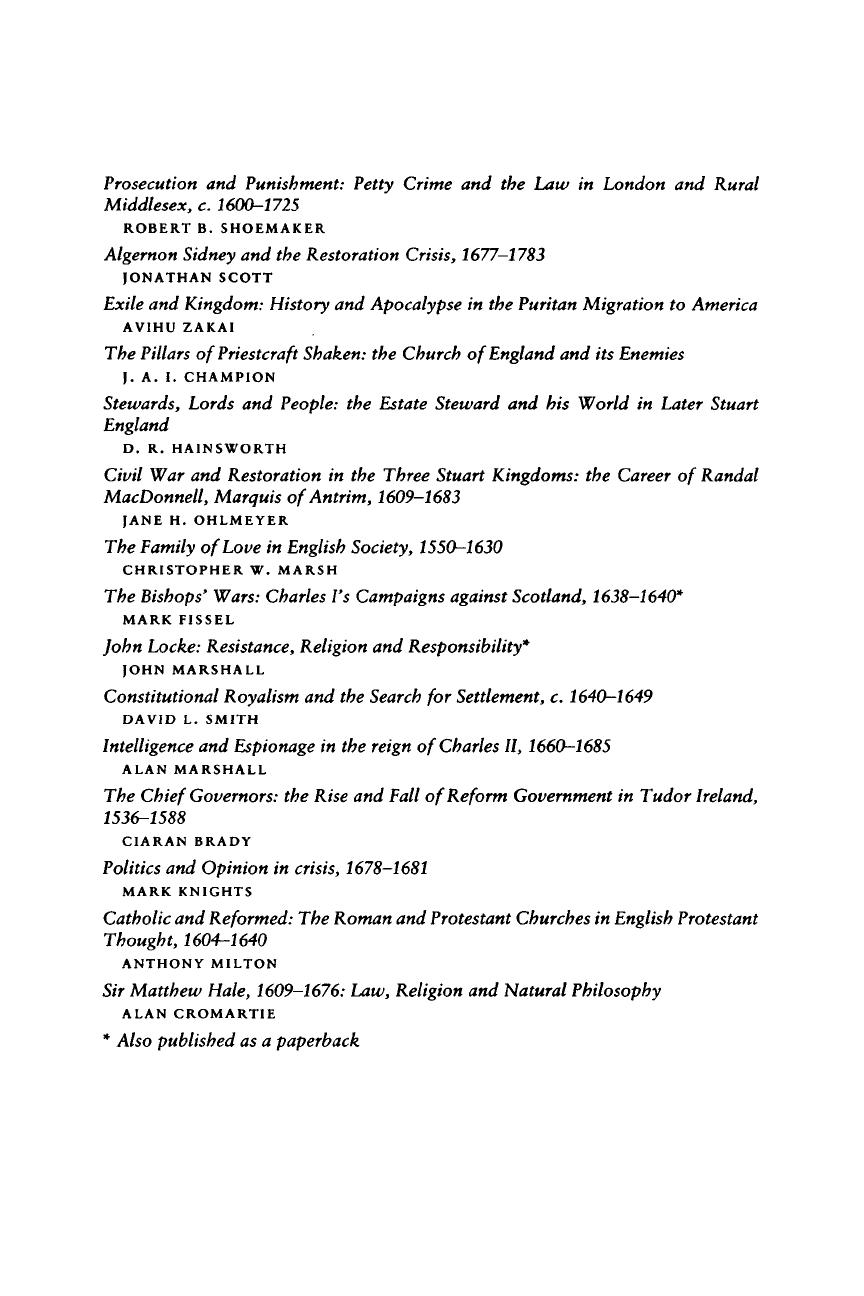
Prosecution and Punishment: Petty Crime and the Law in London and Rural
Middlesex, c. 1600-1725
ROBERT
B.
SHOEMAKER
Algernon Sidney and the Restoration Crisis,
1677—1783
JONATHAN SCOTT
Exile and Kingdom: History and Apocalypse in the Puritan Migration to America
AVIHU ZAKAI
The Pillars of Priestcraft Shaken: the Church of England and its Enemies
j.
A. i. CHAMPION
Stewards, Lords and People: the Estate Steward and his World in Later Stuart
England
D. R.
HAINSWORTH
Civil War and Restoration in the Three Stuart Kingdoms: the Career of Randal
MacDonnell, Marquis of Antrim, 1609-1683
JANE
H.
OHLMEYER
The Family of Love in English Society, 1550-1630
CHRISTOPHER
W.
MARSH
The Bishops' Wars: Charles I's Campaigns against Scotland, 1638-1640*
MARK FISSEL
John Locke: Resistance, Religion and Responsibility*
JOHN MARSHALL
Constitutional Royalism and the Search for Settlement, c. 1640-1649
DAVID
L.
SMITH
Intelligence and Espionage in the reign of Charles II, 1660-1685
ALAN MARSHALL
The Chief Governors: the Rise and Fall of Reform Government in Tudor Ireland,
1536-1588
CIARAN BRADY
Politics and Opinion in crisis,
1678—1681
MARK KNIGHTS
Catholic and Reformed: The Roman and Protestant Churches in English Protestant
Thought, 1604-1640
ANTHONY MILTON
Sir Matthew Hale, 1609-1676: Law, Religion and Natural Philosophy
ALAN CROMARTIE
* Also published as a paperback
